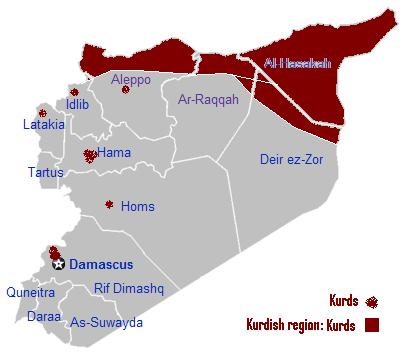
LONDON, — Members of Syrian Kurdish opposition groups involved in the struggle against the regime of President Bashar Al-Assad gathered on Wednesday at the House of Lords for a public meeting, to discuss the current political and humanitarian crisis in the country, and the role of Kurdish groups in both the ongoing struggle and in a post-Assad future.
The meeting was hosted by Lord Hylton and contributions were made by Mr Khalaf Dahowd, European representative of the National Coordinating Body for Democratic Change in Syria (NCB); Mr Alan Semo, representative of the Democratic Union Party (PYD) in Syria; and Mr Reber Hajo, of the Syrian Kurdish Council UK.
Discussion centred around the fragmented state of the opposition to Assad’s regime, which currently includes the Syrian National Council (formed in Istanbul, based in Paris and already recognised as the official representative of the people’s opposition in Syria by France, the US, and others), the NCB, the Syrian Kurdish National Council and the PYD among others. The need to unify opposition groups was emphasised by all speakers, but it will undoubtedly be difficult: the ethnic and religious diversity of the country and decades of systematic discrimination against many, including the Kurds, is one reason why coordination between opposition groups has faltered.
Mr Semo explained that another key reason for this fragmentation is the SNC’s refusal to discuss the position of the Kurds in the opposition or in their plans for a post-Assad Syria. By comparison, Mr Dahowd of the NCB asserted that ‘The Kurdish Question cannot be solved if Syria does not have a democratic system, and Syria will not be democratic until it deals with the Kurdish Question.” Recognition of the existence of the Kurdish people, their national identity and language is an essential prerequisite for the PYD, one of Syria’s largest pro-Kurdish political parties, and remains a critical issue: ‘The SNC talks of the Kurds as France talks of its immigrants. How can I fight with you if you don’t even recognise me?’ Mr Semo asked.
Mr Semo also emphasised that in the post-Assad Syria, which now seems to be inevitable, the national rights of the Kurds must be guaranteed in a new constitution, which protects the rights of all ethnic minorities in Syria. Then, the issue of Kurdish self-determination should be resolved through a referendum that offers the Kurdish people the option of independence, federalism or a form of democratic autonomy.
Discussions around the merits and concerns around foreign military intervention also dominated the meeting. Russia and China vetoed the latest UN Security Council resolution (one of the reasons given at the time was that the opposition was too divided), and with Russia supplying weapons to the regime and reports that Turkey is arming and training the Free Syrian Army inside the Turkish border, it is a clear concern that international players are securing their own interests rather than those of the Syrian people.
This claim was repeated by Mr Dohowd, who remarked that the most recent example of foreign intervention in Libya left thousands dead and hundreds of thousands injured. There was a consensus amongst all that the use of military force by regional and international parties would likely lead to even greater damage to human life and to the country’s infrastructure. Both the NCB and the PYD were clear that they did not support using violence against violence, be it through large-scale foreign military intervention or by supplying arms to small rebel groups on the ground. Mr Dahowd reminded the group that on 2 February, Firat news agency reported that 2 Kurdish conscripts from the Syrian Army were taken hostage by an armed rebel group, and their whereabouts are still unknown.
For information contact:
A Semo: drasemo@hotmail.com
Mobile: 07809687097
Peace in Kurdistan
Campaign for a political solution of the Kurdish Question
Email: estella24@tiscali.co.uk
www.peaceinkurdistancampaign.wordpress.com
Contacts Estella Schmid 020 7586 5892 & Melanie Sirinathsingh – Tel: 020 7272 4131
Patrons: Lord Avebury, Lord Rea, Lord Dholakia, Baroness Sarah Ludford MEP, Jean Lambert MEP, Alyn Smith MEP, Bairbre de Brún MEP, Jeremy Corbyn MP, Hywel Williams MP, Elfyn Llwyd MP, John Austin, Gareth Peirce, Julie Christie, Noam Chomsky, John Berger, Edward Albee, Margaret Owen OBE, Mark Thomas